Annul Haiti’s Second-Round Elections!
By Dady Chery
Haiti Chery
According to various news reports, the Haitians who voted on Sunday, March 20, 2011, in the country’s presidental and legislative elections numbered 4.7 million: a remarkable figure in light of the low turnout and Haiti’s total population of 9 million.
The Haitian press, which normally relishes facts such as these, is more muted since being threatened with reprisal from “the street” and being warned by presidential candidate Michel Martelly that “I’ll be waiting for you!” These threats came in response to an inquiry during a March 9, 2011 presidental debate about Martelly’s three foreclosed houses in Florida.

Most Haitians do not want another sham election from which Haiti’s largest party, Fanmi Lavalas, has been excluded. Both candidates in the March 20, 2011 runoff for president are linked to former dictator Jean Claude Duvalier (Photo: Ramon Espinosa).
During March 2011, the radio stations and newspapers have reported mainly about the reactions of Haiti’s occupiers to the elections. Typical headlines read:
“MINUSTAH salutes the smooth process at the polls”
“Ban Ki-Moun rejoices over the smooth process at the polls”
“The European Union salutes the smooth process at the polls”
“France estimates that the elections are satisfactory”
“The Secretary General of the OEA salutes the smooth elections in Haiti”
The meaning of these statements is not lost on anyone.
In Port-au-Prince, where the elections were most closely monitored, the polling stations opened late, ballots went missing, and voters were turned away, but the New York Times reassured its readers that:
“It was a far cry from the first round of voting in November [2010], when chaos reigned and frustrated voters choosing among 19 candidates trashed polling stations….”
Most jubilant of all about the process was the director of the Provisional Electoral Council (Conseil Electoral Provisoire, CEP) who said at a press conference on March 20, 2011 that “The day’s lesson is that democracy has triumphed.” In Fall 2010, the CEP banned the participation of Aristide’s Fanmi Lavalas party. In turn, Lavalas, which enjoys the support of over 80 percent of the electorate, called for a boycott.
“The turnout was unclear, however.”
The New York Times tersely reported.
In at least the two medium-sized towns of Jacmel (pop. 140,000) and Jeremie (pop. 97,000), the number of voters was estimated to be lower than in November, when the turnout of registered voters was 20 percent or less.
A similar turnout was observed by Kim Ives, in the Port-au-Prince area:
“Our random sampling of final vote tallies at four polling stations (each composed of several “voting bureaus”) in Cité Soleil, Delmas and Lalue revealed that only 17.7% of their registered voters turned out to vote. That participation rate is well below the almost 23% rate of the dramatically flawed 28 November first round, which already marked a record low for Haiti, and all Latin America, since such record-keeping began over 60 years ago.”
The Presidential Elections – Introducing the Candidates
It should have been short work for voters to choose from two indistinguishable presidential candidates in the second round of Haiti’s elections. The choice was Mrs. Mirlande Manigat versus Mr. Michel Martelly, both of them Duvalierists.
Mrs. Manigat was briefly Haiti’s first lady because her husband was a figurehead president during the infamous three-man military junta that followed Duvalier’s dictatorship.
Mr. Martelly is reported to have accompanied the most sanguine members of Duvalier’s secret police on their early-morning runs to collect dissidents.
Either candidate is expected to acquiesce to:
- The U.S. choice for Haiti’s next Prime Minister.
- The continuation of the emergency law that permits former U.S. President Clinton to serve as a de facto governor general in Haiti.
- The continuation of Haiti’s occupation by a UN force of troops and police (MINUSTAH) that numbers over 12,000.
The Legislative Elections
In principle, a newly-seated Haitian parliament that is attentive to the will of the people should oppose the highly unpopular MINUSTAH and the Clinton-led Interim Commission for Haiti’s Reconstruction (CIRH). Consequently, the legislative elections were more important than the presidential ones. They were also more problematic.
In an election where many polling stations were destroyed during the first round, a second round seemed hardly reasonable. In addition, the elections were fraught with irregularities, fraud, and violence.
In some towns, like Damier for example, many voters’ names were missing from the rolls. Some polling stations closed because they had no ballots at all. Others had no ink for marking the voters’ fingers. Several parliamentary candidates were caught engaging in criminal behavior. For example, a LAVNI candidate for parliament destroyed the polling station of the town of Savannette and ripped up most of the ballots. An INITE (Preval’s party) candidate for parliament and several of his entourage were caught voting multiple times in the town of Cap Haitien.
By contrast to the high security in Port-au-Prince, in the provinces many polling places had no security at all. In the town of Saut-d’Eau, a group of men opened fire from a car on the queuing voters, causing the temporary closure of its polling station. The car was later identified as belonging to a former INITE parliamentarian. A major gunshot exchange between partisans of INITE and those of the Lavni party took place in the town of Prien, north of the Artibonite. This resulted in one dead and several wounded. An altercation between partisans of INITE and Alternative in the northwestern town of Mare Rouge, resulted in two deaths, including that of a young man who was inside of a voting center. The rest of the voters erected barricades of burning tires in protest and threw rocks at the cars from which the gunshots had come.
No first round, and therefore no second round
“Some incidents did occur,” the CEP director admitted during an interview with Agence France Presse after the elections, but he concluded that “they will have no impact on the overall electoral process.” He promised to announce the preliminary results of the elections on March 31 and publish the final counts on April 16, 2011.
Haiti, it seems, would hardly need a parliament, with the world community toasting the smooth elections, and Mr. Martelly on course to resolve his housing problems in Miami.
The Haitians who stayed away from the polls beg to differ. A currently popular slogan is:
“There was no first round, so there can be no second round.”
These elections should be annulled. Although Rene Preval’s term will expire in May, there will be no constitutional crisis if a new parliament is not seated until after a round of free and fair elections. Haiti’s legitimate president Jean-Bertrand Aristide is at home now.
References:
- La Presse en Haïti doit prendre garde aux menaces de Michel Martelly
- Haitians Go to the Polls to Choose a New President
- Haïti – Élections : La démocratie par les armes ?
- Le dispositif sécuritaire a contribué au bon déroulement du scrutin
- Topic and Replies Posted by Haiti Election 2010 News
- «La démocratie a triomphé» Gaillot Dorsinvil
- Michel Martelly, Aristide’s weak imitator
Source: Haiti Chery

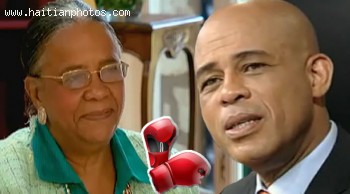
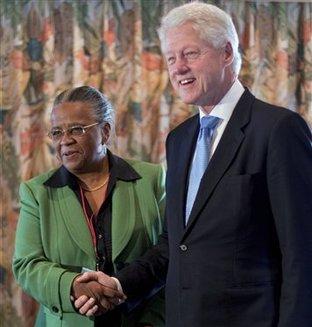
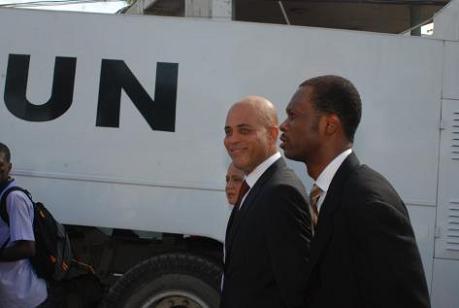
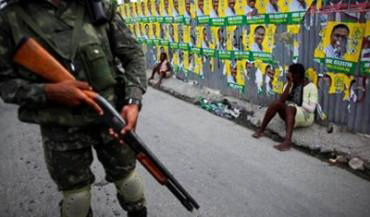
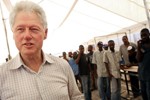
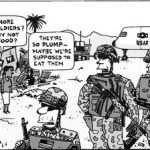




Comments
Annul Haiti’s Second-Round Elections! — No Comments